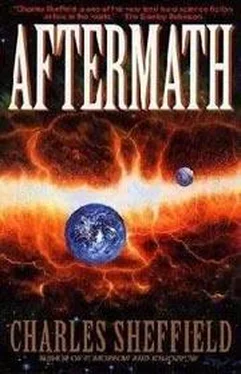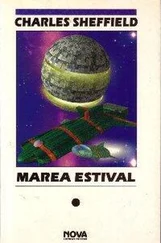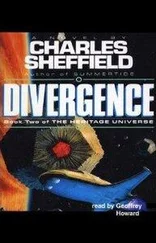The intercom buzzed, and Saul turned to it. “Yes?”
“Two things, Mr. President.” It was Auden Travis again, speaking in an unnaturally low voice. “DOD has a working feed from one of their high-resolution birds. They don’t have the use of the maximum data rate antenna, so the nature and number of images is limited. We only have Australia so far, but General Mackay feels that these images really deserve your attention.”
“Fine. Can you pipe the pictures into this office?”
“Yes, sir. I’ll do that at once. And one other thing, sir. The House Minority Leader and Senator Lopez are waiting in the outer office.”
“Christ. You’ve made my day.”
“I’m sorry, sir. I was given no notice of this. They just arrived. Together.”
“I’m not blaming you, Auden. I’m sure you don’t want them cluttering up your work area. Send the rabble in. If they want to talk to me they’ll have to watch some pictures first.”
“Yes, sir.”
Saul turned to the big display that formed one wall of his office. The lights dimmed, the windows with their polarizing filters became opaque, and the first image blinked into existence. It was in simple false color rather than the derived hyperspectral presentation that Saul preferred. He could guess the reason. Three-band color could be done with a lower data rate. The people controlling the satellite had decided — rightly, in Saul’s opinion — to opt for maximum coverage area. Anything really interesting would be caught in more detail on a later orbit.
The image had no vocal tags. Latitude and longitude tick marks were shown on the outer boundaries, and the words Sydney, Australia appeared in small letters in the bottom left-hand corner.
Saul leaned forward. He had not visited Sydney for twenty years, but he had seen plenty of satellite coverage during the Queensland Secession War. What he was looking at was nothing like Sydney.
The great drowned valley that had created and framed Sydney Harbor no longer existed. In its place stood a deep brown smear, miles across, as though a giant ball had rolled over the land from west to east.
Saul heard the door behind him open and close. He ignored it and called for a zoom of the center part of the image. The effect was of flying in closer and closer, a small area viewed in exquisite detail. He should see individual roads and houses and cars, even people.
He saw nothing but an endless wasteland of mud.
Sydney was gone. What had replaced it bore no more signs of human influence than the satellites of Neptune.
Brisbane, Australia. An open expanse of water and, miles to the west, a new coastline. The satellites used absolute latitude and longitude to pinpoint their images. Brisbane now lay beneath the Pacific Ocean.
Had any of the models predicted tidal waves, earthquakes, and massive sea-level changes? If they had, no one had presented those results to Saul. Perhaps they had been discarded, on the grounds that they were “implausible.”
He stayed with it for a few more scenes. The whole southeast of Australia, judging from the images of Adelaide and Melbourne, had shared the same fate as Sydney and Brisbane.
Saul asked for an image of Canberra, which lay inland and on high ground. It should have escaped damage from the sea. Perhaps it had. It was impossible to tell, because the area was covered by impenetrable clouds. Their sinister tinge of dull red suggested that the surface beneath had been blown high into the atmosphere.
In his scan of the list of incoming calls, Saul had noticed nothing from Australia and New Zealand. Now he knew why.
He heard the creak of chairs behind him. Someone was increasingly excited or impatient. For the moment, he had seen enough. Saul killed the display, watched as a snowy vista gradually reappeared outside the window, and finally turned around.
“Good morning. Excuse me if I did not greet you earlier. I felt that I — and you — ought to examine firsthand what is happening around the world.”
Saul knew that the smiles greeting him were as hollow as his own words. The two visitors made a splendid study in contrasts, proving once again that politics was flexible enough to accommodate every human strength and weakness.
Sarah Mander had an unlined, guileless face. Yet she was probably the most secretive person in Washington, man or woman. She was also cultured, witty, well educated, vengeful, racist, and anti-Semitic. It depressed Saul that conversations with such a witch could be so enjoyable.
Senator Nick Lopez was round-faced and brown-complexioned. The hair above his broad brow was set in a high, old-fashioned pompadour that resembled a frizzy black hat. Saul wondered where Lopez found a hairdresser willing to perpetrate such a monstrosity. Lopez had degrees in mathematics and law, but openly disdained “book learning.” He was fast-talking, confident, and supernaturally bright, and after a meeting with him Saul always came away feeling that he had somehow been tricked, in a way that he didn’t quite understand. Nick Lopez also had his darker side, one that would not be revealed in public.
“The House Minority Leader and the Senate Majority Leader visiting me together,” Saul said musingly. “I’m not sure what the appropriate protocol is for such a rare combination of forces.”
Sarah Mander smiled. “Count the spoons when we leave, I guess.”
In spite of himself, Saul found he was grinning back at her.
“It’s our dollar.” Lopez made no attempt at small talk. “I guess we should explain why we came.”
“And we’ll be brief,” added Mander. “You’re a busy man, Mr. President. Two thousand calls to return.”
Eighteen hundred and forty-seven. But that was twenty minutes ago, by now she was probably right. After the meeting he would learn where she had learned the number. But then it would hardly be worth knowing, since obviously she expected him to find out.
“Thanks for your consideration, Sally. Go ahead.”
“Cheap shot, Mr. President. You can do better than that.”
And she was right. It was a cheap shot. He knew she preferred “Sarah” and hated the more informal version of her name. Sally Mander. Lizard woman. She must have been taunted with jibes like that since she was a kid.
“Sorry, Sarah. I’m in a bad mood today and I feel stupid.”
“Sure. Pull the other one. Nick?”
“This is only a preliminary meeting.” Lopez picked up without hesitation. “We want to present an idea. I’m glad we saw those images, because they reinforce our point.”
“Which is?” Saul sensed the change. The overture was over, the action had begun.
“This country has taken a real beating, but we will recover. And I think we’ll be like a broken bone, stronger than ever when we heal.”
“God, I hope you’re right. I keep telling myself that, but then I look outside.” Saul gestured to the window, where the snow fell constantly.
“It was in the latest weather forecasts, and it’s not the Fimbulwinter ,” Sarah Mander said. “It might last three days, but it won’t last three years. It will end. I spoke with Science Adviser Vronsky early this morning. The supernova is fading.”
“And about time.”
“But other countries have not been so fortunate.” Lopez ignored the others’ comments, they were a sidebar to the main theme. “Australia, Micronesia, and South America are ruined. I don’t know if they exist anymore. South Africa is silent, and the rest of the continent is chaos. United Europe has fragmented to its pre-Union nationalism. The Sino Consortium was about to walk all over us in trade, now the members are back in the Stone Age. The Golden Ring is broken, and their radio reports suggest a total collapse of central authority. Congresswoman Mander and I have compared notes. Outside of western Europe we cannot discover a single foreign entity that today deserves the name of nation.”
Читать дальше












